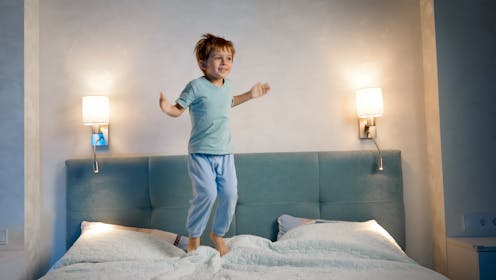Should I loosen up on the kids' bedtime these holidays – or stick to the schedule? Tips from a child sleep expert
- Written by Sarah Blunden, Professor and Head of Paediatric Sleep Research, CQUniversity Australia

Summer holidays often mean sunshine, beach trips, mountain hikes, relaxation, catching up with family and friends, and the chance to sleep in.
For many parents, the temptation is to loosen up on the kids’ bedtime routine, let them stay up late, and allow them to catch up on sleep with a lie-in the next morning.
I have spent the past 15 years researching, diagnosing and treating children’s sleep problems and difficulties, and particularly studying how sleep (or lack of it!) can affect health, wellbeing and school performance in young people.
The evidence suggests a few one-off late nights and sleep-ins won’t hurt, but it’s best not to fall completely off the bedtime routine wagon during the holidays. It can be very hard to get back on track once school starts.
If we want to enjoy a relaxing, sleep-fulfilled holiday and a healthy circadian system, the best compromise is to maintain a regular wake time.
It’s fine to be more flexible about bedtime in the holidays than during school time. But parents must factor in the negative effects of allowing circadian rhythms to spiral out of control.
Read more: Many parents use melatonin gummies to help children sleep. So how do they work and what are the risks?[3]
Why spiralling circadian rhythms is a problem
Even relatively minor differences in wake time can upset your rhythms. For example, research[4] shows problems arising for young people who “catch up” on sleep missed during the week by sleeping in an extra two or more hours on the weekend.
Sleep science research[5] supports the need for bed and wake times to be consistent across the week and weekend.
That’s not just because it ensures young people get enough sleep; even more importantly, it helps because our innate circadian clock needs regularity.
Our circadian clock is what dictates what time[6] we should be awake and when we should be asleep. Sleepiness and circadian rhythms need to be regular so they can work together. When they do, it is best for our quality of sleep but also for our general health[7].
Irregular rhythms – which happen when bed times and wake times are significantly different between school weeks and weekends – can negatively affect[8] mood, psychological and physical health, social engagement and school performance.
The risk with letting kids go to bed late a few nights in a row is that they’ll sleep progressively later each day. Delaying the wake time again and again has knock-on effects; they won’t feel sleepy until even later again that night. An even later bedtime can lead to an even more delayed wake time the next day. And so it goes on.
As you can see, “catching up” on sleep with a lie-in can end up worsening the pattern.
If this happens over the entire school holidays, not only could the bedtime get later and later but the circadian rhythm will become accustomed to being later and later.
Resetting the body clock
If over the school holidays your child’s circadian rhythm has got later and later, resetting the circadian clock to a school-friendly, manageable time is certainly possible. But it requires some considerable readjustments and sometimes professional help.
If wake times do get out of kilter, try making them progressively earlier[9] and earlier gradually over a few weeks before school starts until the required wake time is achieved. This requires commitment from the entire family, and motivation from the young person themselves.
A better solution might be to make sure circadian rhythms don’t get out of control in the first place.
References
- ^ Photo by Polina Zimmerman/Pexels (www.pexels.com)
- ^ CC BY (creativecommons.org)
- ^ Many parents use melatonin gummies to help children sleep. So how do they work and what are the risks? (theconversation.com)
- ^ research (www.tandfonline.com)
- ^ research (biol111blue16f.academic.wlu.edu)
- ^ time (onlinelibrary.wiley.com)
- ^ health (www.sciencedirect.com)
- ^ negatively affect (link.springer.com)
- ^ progressively earlier (www.childpsych.theclinics.com)

















